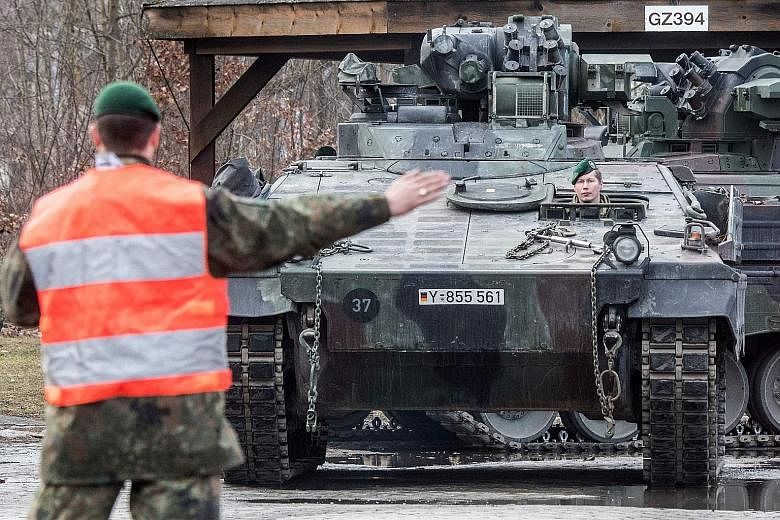SESTOKAI (Lithuania) • A bright-red locomotive slowed to a halt, its freight cars obscured in the blinding snow, bearing the Iron Cross of the Bundeswehr, Germany's army.
Evocative of old war films, the scene is a sign of the new times.
Seven-and-a-half decades after the Nazis invaded, the Germans are back in Lithuania - this time as an ally.
Nearly 500 German troops are on an open-ended Nato deployment near the Russian frontier.
Analysts call it Germany's most ambitious military operation near the Russian border since the Cold War.
The German-led deployment - also involving troops from Belgium, Holland and Norway - sends a muscular message to Russian President Vladimir Putin: Back off.
The deployment is offering a window into renewed German strength - as well as the Russian strategy for repelling it: Russia is accused of being behind e-mails sent to Lithuanian police, the media and top politicians, falsely claiming that German troops had gang-raped a local 15-year-old girl.
Hackers have targeted government servers and television channels. Pro-Russian websites are harking back to Adolf Hitler and calling the Nato deployment a "second invasion" by Germany.
Yet, in the former Soviet republic now living in the shadow of Russia and which joined the European Union and Nato in 2004, the Nazis are ancient history.
To many here, Germany is a bastion of democratic principles, a strong advocate of human rights and measured diplomacy.
And Lithuanians' fear of the bear on their doorstep is surging. Since the de facto invasion of Ukraine and the annexation of Crimea, Russian politicians have begun speaking ominously about a key warm-water port that they say was wrongly "gifted" to Lithuania after the collapse of the Soviet Union.
In some of Germany's neighbours - particularly Poland - there remains some opposition to renewed German military might. But old prejudices are dying fast.
Noting that Britain is breaking away from the EU, Lithuanian Defence Minister Raimundas Karoblis called Germany the most likely new guarantor of regional stability.
"Why not Germany? Why not?" he said.
WASHINGTON POST

